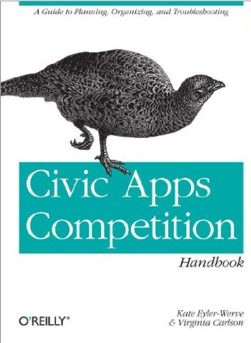| Civic Apps Competition Handbook |
|
Author: Kate Eyler-Werve and Virginia Carlson The idea of the Civic App Competition isn't new but it has not yet gone global - although this slim book may act as a catalyst.
Author: Kate Eyler-Werve and Virginia Carlson You might not have come across the idea of Civic Apps, let alone competitions to create them. Although it’s not a new idea, it has not as yet gone global and this slim book may act as a catalyst.
If you are new to this idea, start by reading the preface. Here we learn that Civic App Competitions (CACs) are to encourage developers to build innovative applications using the open government data that these days pours forth from the government agencies of every democracy. The experience related in this book is largely from Chicago where the authors organized A4MC - Apps for Metro Chicago - but it also draws on a survey of 15 other CACs across North America, i.e. the US and Canada.
Chapter1 provides some history to put A4MC, which took place in 2011, into context. The first such competition was sponsored by Washington D.C in 2008 and inspired others to follow suited due to its success. However we are soon given reason to believe that its claimed 4000% ROI - an outlay of $50,000 led to apps to the value $2.3 million being created - might be an exaggeration. It also points out that open government data is expected to promote entrepreneurship and so far the number of small businesses arising out of a CAC has been small. Chapter 2 focuses on the potential benefits of CACs. It examines the goals outlined in Chapter 1 - increased transparency, government efficiency and innovation - in more detail using the case study of the winner of AMC4, Elizabeth Park who initiated iFinditChicago.com, a mobile app that provides information about access to food, shelter and medical care. In the next chapter the benefits are translated into specific goals and metrics that enable competition organizers to gauge their success culminating in a “Table of Robust Goals and metrics”. As befits a handbook, this is a highly practical book and the next two chapters examine costs, including staffing and data resources. Chapter 6 is described as “the fun part” and covers designing the competition – looking at incentives, prizes, judging and engagement tactics. Perhaps the most useful content is Chapter 7 which looks at unexpected issues that threaten to undermine the whole plan. It covers problems such as who owns the app after the competition is over, preventing public voter cheating and dealing with disgruntled participants and legal issues. The final chapter, Building on Success, looks at how to sustain interest in open government data. This is certainly a niche book, but it will be very valuable to those caught up in the currently popular trend of organizing local competitions for using open government data. As the idea spreads outside North America, why reinvent when you can build on the experience of others?
|
|||
| Last Updated ( Tuesday, 08 January 2013 ) |

